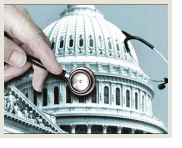| |
 Robert Reich, Op-Ed: The Glaxo case is the latest and biggest in a series of Justice Department prosecutions of Big Pharma for illegal marketing prescription drugs. In May, Abbott Laboratories settled for $1.6 billion over its wrongful marketing of an antipsychotic. And an agreement with Johnson & Johnson is said to be imminent over its marketing of another antipsychotic, which could result in a fine of as much as $2 billion. Robert Reich, Op-Ed: The Glaxo case is the latest and biggest in a series of Justice Department prosecutions of Big Pharma for illegal marketing prescription drugs. In May, Abbott Laboratories settled for $1.6 billion over its wrongful marketing of an antipsychotic. And an agreement with Johnson & Johnson is said to be imminent over its marketing of another antipsychotic, which could result in a fine of as much as $2 billion. |
| |
 Haider Rizvi, News Analysis: According to the U.N., there is a shortfall of 167 billion dollars in terms of Official Development Assistance, which is making it difficult for various agencies involved in achieving development goals aimed at fighting poverty, deadly diseases and climate change. Thus, in addition to an international tax, the U.N. is proposing several other ways to tap resources that could strengthen international actions for sustainable development, such as taxes on carbon emissions, air traffic, and financial and currency transactions. Haider Rizvi, News Analysis: According to the U.N., there is a shortfall of 167 billion dollars in terms of Official Development Assistance, which is making it difficult for various agencies involved in achieving development goals aimed at fighting poverty, deadly diseases and climate change. Thus, in addition to an international tax, the U.N. is proposing several other ways to tap resources that could strengthen international actions for sustainable development, such as taxes on carbon emissions, air traffic, and financial and currency transactions. |
| |
 Agnes Binagwaho, Op-Ed: With Global Fund support for our national institutions, we have achieved universal access to lifesaving antiretroviral therapy for people living with HIV, and we have stabilized HIV prevalence at around 3% of the population. Similarly, Rwanda's tuberculosis program has become a model for Africa, and all Rwandan families now have access to insecticide-treated bed nets to prevent malaria, contributing to an 87% drop in cases during the last seven years. Agnes Binagwaho, Op-Ed: With Global Fund support for our national institutions, we have achieved universal access to lifesaving antiretroviral therapy for people living with HIV, and we have stabilized HIV prevalence at around 3% of the population. Similarly, Rwanda's tuberculosis program has become a model for Africa, and all Rwandan families now have access to insecticide-treated bed nets to prevent malaria, contributing to an 87% drop in cases during the last seven years. |
| |
 Pat Garofalo, News Analysis: Though the labor market is improving, there are still nearly four unemployed workers for every available opening, and the average duration of unemployment is currently 40 weeks — longer than the 26 weeks of benefits most states provide. Since the recession, the federal government has picked up the tab for up to 99 weeks of unemployment through the EUC program. Pat Garofalo, News Analysis: Though the labor market is improving, there are still nearly four unemployed workers for every available opening, and the average duration of unemployment is currently 40 weeks — longer than the 26 weeks of benefits most states provide. Since the recession, the federal government has picked up the tab for up to 99 weeks of unemployment through the EUC program. |
| |
![Is Obama's Corporate-Friendly Approach Really]() Richard (RJ) Eskow, Op-Ed: The Right's "big lie" of the week is its claim that the health bill contains "the largest tax increase in history." It's not even close, and its biggest increase is for those who earn more than $200,000 per year. But middle-class families will take a hit when the law raises the limit for deductible medical expenses to 10 percent of adjusted earnings, up from its current 7.5 percent. Richard (RJ) Eskow, Op-Ed: The Right's "big lie" of the week is its claim that the health bill contains "the largest tax increase in history." It's not even close, and its biggest increase is for those who earn more than $200,000 per year. But middle-class families will take a hit when the law raises the limit for deductible medical expenses to 10 percent of adjusted earnings, up from its current 7.5 percent. |
| |
 Zach Toombs, News Report: The software probe and the heavy financial sanction appear to have had no punishing impact on Pratt & Whitney's extensive and continuing contract work for the Defense Department, however. That's the same department that in an ironic twist announced this spring that it was reorienting its forces to deal with what its officials regard as a rising Chinese military threat against U.S. allies in the region. Zach Toombs, News Report: The software probe and the heavy financial sanction appear to have had no punishing impact on Pratt & Whitney's extensive and continuing contract work for the Defense Department, however. That's the same department that in an ironic twist announced this spring that it was reorienting its forces to deal with what its officials regard as a rising Chinese military threat against U.S. allies in the region. |
| |
 Carol Linnitt, Video Report: The prospect of the expansion of this unscientific wolf cull, projected to claim the lives of roughly 6,000 wolves over the next five years, has outraged conservationists and wildlife experts. While the wolves dodge bullets and poison, this scandal is flying largely under the public radar. A team of DeSmogBlog researchers traveled to the Tar Sands region to investigate the dirty oil politics behind this fool's errand. Here is our first report: Cry Wolf: An Unethical Oil Story. Carol Linnitt, Video Report: The prospect of the expansion of this unscientific wolf cull, projected to claim the lives of roughly 6,000 wolves over the next five years, has outraged conservationists and wildlife experts. While the wolves dodge bullets and poison, this scandal is flying largely under the public radar. A team of DeSmogBlog researchers traveled to the Tar Sands region to investigate the dirty oil politics behind this fool's errand. Here is our first report: Cry Wolf: An Unethical Oil Story. |
| |
 Froma Harrop, Op-Ed: Contrary to right-wing mythology, America's uninsured are not the idle poor. They already have government-guaranteed health care, as do the elderly, the disabled, government workers and prisoners. Left out are the modest folk who earn too much to qualify under the old Medicaid rules but not enough to afford insurance in the private market (and, by the way, who subsidize others' coverage). The Medicaid expansion is for them. Froma Harrop, Op-Ed: Contrary to right-wing mythology, America's uninsured are not the idle poor. They already have government-guaranteed health care, as do the elderly, the disabled, government workers and prisoners. Left out are the modest folk who earn too much to qualify under the old Medicaid rules but not enough to afford insurance in the private market (and, by the way, who subsidize others' coverage). The Medicaid expansion is for them. |
No comments:
Post a Comment